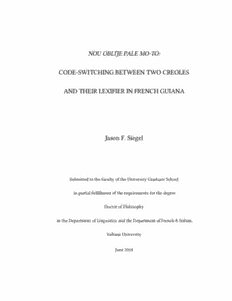
Nou oblije pale mo-to: Code-switching between two Creoles and their lexifier in French Guiana PDF
Preview Nou oblije pale mo-to: Code-switching between two Creoles and their lexifier in French Guiana
NOU OBLIJE PALE MO-TO: CODE-SWITCHING BETWEEN TWO CREOLES AND THEIR LEXIFIER IN FRENCH GUIANA Jason F. Siegel SubmiedtothefacultyoftheUniversityGraduateSchool inpartialfulfillmentoftherequirementsforthedegree DoctorofPhilosophy intheDepartmentofLinguisticsandtheDepartmentofFrench&Italian, IndianaUniversity June2014 UMI Number: 3628660 All rights reserved INFORMATION TO ALL USERS The quality of this reproduction is dependent upon the quality of the copy submitted. In the unlikely event that the author did not send a complete manuscript and there are missing pages, these will be noted. Also, if material had to be removed, a note will indicate the deletion. UMI 3628660 Published by ProQuest LLC (2014). Copyright in the Dissertation held by the Author. Microform Edition © ProQuest LLC. All rights reserved. This work is protected against unauthorized copying under Title 17, United States Code ProQuest LLC. 789 East Eisenhower Parkway P.O. Box 1346 Ann Arbor, MI 48106 - 1346 AcceptedbytheGraduateFaculty,IndianaUniversity,inpartialfulfillmentofthe requirementsforthedegreeofDoctorofPhilosophy. DoctoralCommiee: [AlbertValdman,Ph.D,Co-Chair.] [KevinJ.Roet,Ph.D,Co-Chair.] [JulieAuger,Ph.D.] [J.ClancyClements,Ph.D.] [DanielSuslak,Ph.D.] December9,2013 ii Copyright©2014 JasonF.Siegel iii Anowledgments erearealwaysmanypeopletothankinanundertakingsuchasadissertation. Firstand foremost, I must thank my commiee members, Julie Auger, Clancy Clements, Daniel Suslak, and especially my co-chairs Kevin Roet and Albert Valdman, for their reliable encouragement and helpful feedback. Dr. Roet went above and beyond the call of an adviserbymeetingwithmeeveryweektogivevaluableadviceandtohelpmestrengthen my research and argumentation. Dr. Valdman took me on early in my graduate career and served as a valuable mentor on all maers of life as an academic, both intellectual and pragmatic. I must also thank Barabara Vance and Laurent Dekydtspoer for their informal advising on maers of syntax, as well as Marvin Moody, who encouraged me early on and throughout my graduate career. I am extremely grateful for the contribu- tions of all those mentioned above, and any errors and misjudgments are of course my own. Iamalsoindebtedtothosewhomadethisresearchpossible. eCenterofLatin AmericanandCaribbeanStudiesatIndianaUniversityfundedmyinitialtriptoCayenne, where I was able to conduct preliminary research and develop ties to the Haitian com- munity in Cayenne. e Department of French & Italian funded not only my research tripinthespringof2011,butalsothepurchaseofseveralpiecesofrecordingequipment throughtheGraceP.Youngaward. eDepartmentalsogenerouslyfundedseveralyears ofmygraduatestudies,alongwiththeCreoleInstitute. iv isresearchwouldalsonothavebeenpossiblewithoutthehelpofmycontacts in French Guiana. While I cannot mention most of them by name without violating the confidentiality of my speakers’ identities, I will do my best to accurately describe theircontributions. MylandladyClaudeeconnectedmetoalargenumberofHaitians, students and adults alike, including the two speakers whose speech is studied in great depth in this dissertation. Beyond her contributions to this dissertation, she and her partnershowedmetheculturalbeautyofFrenchGuianaandmadeitahomeawayfrom home. e Haitian Consul in Cayenne provided me with a hard to find copy of a movie made by Haitians in French Guiana about their difficulties in the region, helping me beer understand what life was like in the capital. My consultants for Guianese proved invaluable resources about grammatical paerns in the language. e IUFM of French Guianagraciouslyprovidedmewithspaceandlogisticalassistanceformypilotproject. Lastly,Ithankmytwospeakers,RéginalandMichel,fortheirgenerosityandwillingness tosharetheirtimeandlanguagewithme. A special thanks goes to Solfis Telfort, who did the initial transcription of all interviews, from the initial exploratory trip to this dissertation. Without his excellent work, this dissertation would have been immeasurably more difficult. Another special thanksgoestotheDissertationWritingSupportgroupatIndianaUniversity,whoseen- couragement and shared struggles gave me perspective, comfort, and added motivation tocontinueonwiththearduousanddeeplygratifyingtaskoffinishingthedissertation. Finally, I must thank my family. My parents, Jerry and Cathy, provided me with financial and emotional support to take on a project of this magnitude. My sister Kim taught me the tricks of living graduate student life cheaply. And last but not least is my partnerMa,whosecourageandaffectionhavebeenaconstantsourceofinspiration. v JasonF.Siegel NOUOBLIJEPALEMO-TO: CODE-SWITCHINGBETWEENHAITIANANDGUIANESEFRENCHCREOLESAND THEIRLEXIFIERINFRENCHGUIANA etheoriesandmethodologiesdevelopedtoanalyzeintrasententialcode-switch- ing were developed to account for switching between clearly distinct languages. ey seek to describe the constraints on intrasentential code-switching, essentially trying to account for how languages with very different structures can fit together in a single sentence. In this dissertation, I take a different approach, looking at languages that are much more closely related, namely French, Haitian Creole and Guianese Creole. ese languages pose a special challenge because not only do they closely match each other in terms of phonology, but their morphology is frequently similar as well, which can maketheidentificationofswitchpointshighlydifficulttoascertain. Totestthetheories, Istartbyreviewingabroadswathofliteraturerelevanttocode-switchingamongclosely related varieties, including dialect contact and acquisition phenomena, as well as theo- ries of language production and code-switching. I examine the social seing of creoles and their lexifier in contact in French Guiana. I also provide a grammatical sketch of the important differences among the varieties in question. In the major chapter of the dissertation, using the speech of Haitian immigrants in French Guiana as a test case, I look at a variety of possible code-switches that test the major claims of two models of code-switching, to see whether they can account for switches that occur between vari- eties that are not clearly distinct. I find that the theories as they exist now adequately— but not perfectly— account for code-switching in this circumstance. As a result, I pro- poseanewlineofinquiryforsociolinguisticvariationusingpsycholinguisticmethodsto evaluatewhetherlanguage-internalvariationiscode-switchingbetweensubgrammars. vi Table of Contents Anowledgments iv Abstract v TableofContents vii ListofFigures xi ListofTables xii ListofAbbreviations xiv ListofAppendices xv Chapter1 Introduction 1 1.1 Languagecontactordialectcontact? 2 1.2 Mutualintelligibility 5 1.3 Contextofcontact 8 1.4 Code-switching 13 1.5 Outline 14 Chapter2 LiteratureReview 16 2.1 Dialectcontact 16 vii TableofContents 2.2 Seconddialectacquisition 30 2.3 Psycholinguisticapproachestolanguageproductionandcode- switching 32 2.4 Code-switching 46 2.4.1 eoriesofcode-switching 46 2.4.2 Code-switchingincloselyrelatedvarieties 57 2.4.3 PreviousstudiesofHaitianCreolecode-switching 62 2.5 Conclusion 74 Chapter3 Socialsettingofcontact 77 3.1 HistoryofFrenchGuiana 77 3.1.1 Slavecolony 77 3.1.2 Aerslavery: Penalcolonyandgoldrush 79 3.1.3 Departmentalization 81 3.2 HaitianmigrationintoFrenchGuiana 82 3.3 FrenchGuianatoday 85 3.4 FrenchCreoledialectsspoken 94 3.5 DialectsofGuianese 104 Chapter4 Structuralcomparisonandmethodology 107 4.1 Studydesign 107 4.1.1 Speakerselection 107 4.1.2 Transcription 110 4.1.3 Analysis 112 4.2 ComparisonofGuianeseandHaitianCreoles 112 4.2.1 Sharedfeatures 113 4.2.1.1 Phonology 113 4.2.1.2 Morphology 114 viii TableofContents 4.2.1.3 Syntax 115 4.2.1.4 Semantics 118 4.2.1.5 Lexicon 119 4.2.2 PrincipaldifferencesbetweenGuianeseandHaitian 121 4.2.2.1 Phonologicaldifferences 121 4.2.2.2 Morphologicaldifferences 122 4.2.2.3 Syntacticdifferences 123 4.2.2.4 Lexicon 127 4.3 ComparisonbetweenFrenchandHaitian/Guianese 129 4.3.1 SimilaritiesbetweenFrenchandCreole 130 4.3.1.1 Phonology 130 4.3.1.2 Morphology 131 4.3.1.3 Syntax 131 4.3.1.4 Semantics 132 4.3.1.5 Lexicon 133 4.3.2 DifferencesbetweenCreoleandFrench 133 4.3.2.1 Phonology 133 4.3.2.2 Morphology 134 4.3.2.3 Syntax 135 4.3.2.4 Semantics 138 4.4 Conclusion 139 Chapter5 Results&Analysis 141 5.1 Determinationofswitches 143 5.2 Code-switches 150 5.3 Functionalandhighfrequencyitems 188 5.3.1 eindefinitearticleoun 190 5.3.2 Personalsubjectpronouns 191 ix
